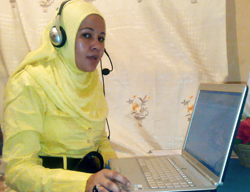It was February 2008 when Bahjo Mohamud Abdi received her first anonymous phone call. It was a man’s voice asking her to confirm who she was. Abdi was a presenter and correspondent for the state radio in Somalia’s semi-autonomous region of Puntland. Abdi confirmed her identity and thought no more about it. But then she received another anonymous phone call two hours later–informing her that she was talking to the “Somali Mujahadeen” and that they could see her in the local shopping center in downtown Baidoa.
Although young and one of the few women in the media business in Puntland, Abdi was rapidly becoming a veteran in the field having worked for different radio stations across Puntland and earlier as a reporter in Mogadishu. Radio Galkayo used shortwave signals and had a wide range across Puntland, Abdi told me. She often reported about attacks across the region and the insurgent Somali group, Al-Shabaab, did not like the negative coverage. Perhaps her worst crime, though, was the fact she was a woman working in the profession. Al-Shabaab diaspproves of women working, even in informal markets or within women’s organizations. The only job for women that appears to be acceptable to them is joining their group as a militia.
After receiving the second phone call, Abdi panicked and called the local police for an escort to drive her home. Once she got home they called again. She switched her phone off. “When I finally got the courage to turn my phone on I had so many messages telling me to stop my work as a journalist,” she said. “I started to loathe my own cell phone.” After a week of hiding in the house, Abdi drove with a female friend to the center of town. Suddenly, the two women heard a loud bang behind them and saw a man running toward them. “We sped away before he could reach us,” she said. “The woman next to me had shrapnel in her face. We somehow drove away, despite having a flat tire and the right hand door wide open.” The two rushed to a local hotel and eventually received treatment in a hospital in Baidoa.
For months, Abdi could not work despite her active spirit. “Life was horrible,” she remembers. “It was self-induced imprisonment.” Then in October 2008, four armed men broke into her house, killing one man and injuring another. Abdi managed to escape and recognized one of the men as the one that targeted the car. She changed her SIM card in her cell phone, “but the calls kept coming,” she said. After escaping and living in Mogadishu for a spell, Abdi found another job working for the Somali Broadcasting Corporation back in her hometown of Galkayo.
Despite her mother’s pleas for her to stop working, Abdi stuck to it; she was after all one of the few breadwinners in the family. But then she decided to give her cell phone to her younger brother. He started receiving threatening calls, including one that said a government officer had been killed in Galkayo and that Abdi was next. There was nothing left for Abdi to do but leave her family behind and flee to neighboring Kenya.
In September 2009, Abdi took a 10-day trip across the border to Garissa, Keny,a in an overcrowded land cruiser. Traveling from Galkayo in Puntland to Garissa in northeast Kenya, she started life in Kenya in a refugee camp. “But I couldn’t work in the camp,” she said. “You can’t do anything, and the Al-Shabaab were active in the camps. I was scared and moved to the city.” Kenyan police demanded a bribe along the journey to Kenya’s capital, Nairobi, and Abdi found herself penniless in a busy, cosmopolitan city.
Like most Somali refugees, Abdi ended up living in the chaotic, bustling part of Nairobi known as Eastleigh, where many Somalis eke out a living by pooling their resources together. Abdi and her friend–the same girl injured in the car attack in Baidoa–now live together in a tiny room. Despite their meager surroundings, the room costs them $160 per month. The influx of Somali refugees escaping the war back home has created a demand for living space and many landlords are taking advantage of the crisis–Eastleigh is now awash with residential centers and apartments originally meant for one family now divided into two.
But the costs are not the skyrocketing rent and utility bills alone. Police often prey on refugees to demand bribes or face illegal arrests. “Sometimes you cannot tell the difference between the pickpockets and the police,” said Mohamed Abdi Elmi, a former Somali journalist and Eastleigh resident who has now left the area. As tensions between Kenya and Somali insurgents increase, security crackdowns on Somalis in Eastleigh are also on the rise. “Once you would see people chatting, going about their business in the streets in Eastleigh in the evenings,” a local shopkeeper, Abdullahi Said, told me. “But now after 6 p.m. the streets are deserted. Everyone is too scared of the police, other Somalis, etc. Everyone just locks themselves inside.”
Although less frequent, Abdi still receives threatening text messages and even emails informing her that they know of her whereabouts. While safer than Mogadishu, she still feels unsafe in Nairobi and is even considering moving again. “I feel that the circumstances I am in right now in Nairobi are very much similar to that I have fled in Somalia,” she told CPJ. Abdi says she would like to jump back into journalism, but with language barriers and the ongoing threats, she would simply not dare to try.
We learned of Abdi’s case in 2010 and have assisted her as she struggles to survive and stay safe in Nairobi. CPJ has assisted more than 10 Somali journalist cases throughout 2010 and continues to seek ways to help the ever-growing number of exiled Somali journalists as they flee persecution back home.
